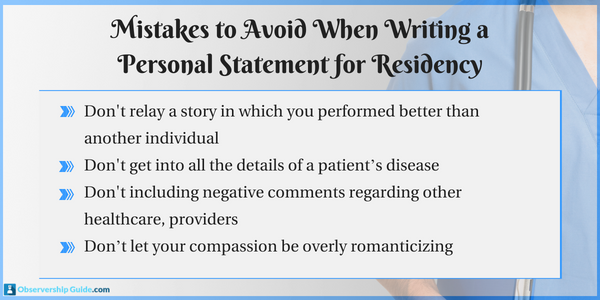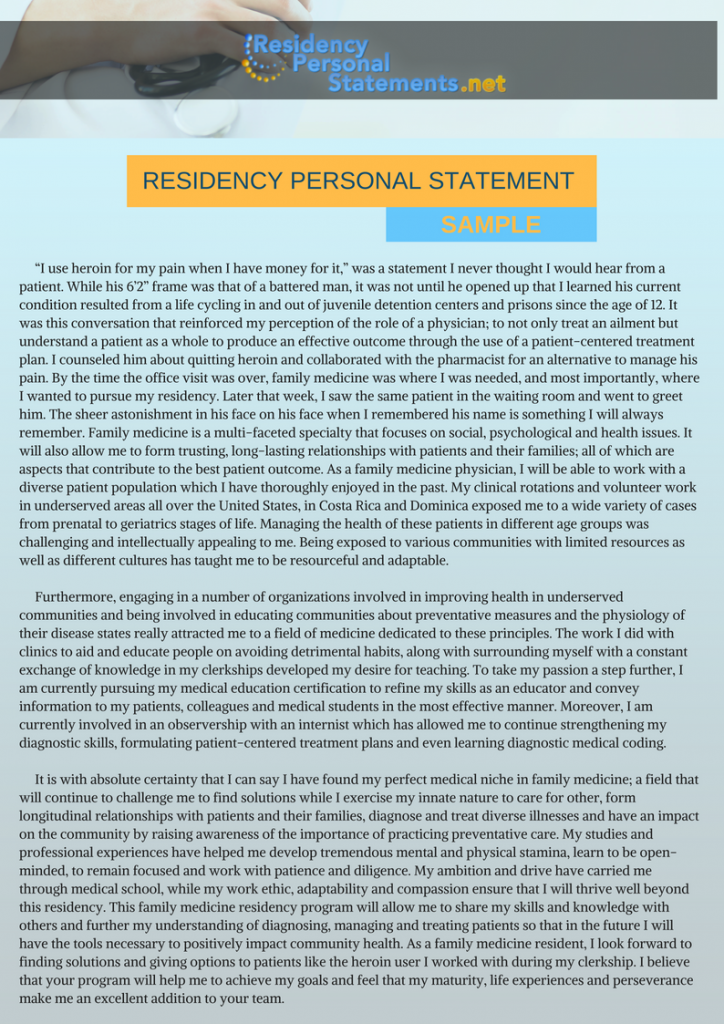
For years, universities have been using the residency application personal statement to create harmony in the application process. With thousands of students applying, it’s up to the university to utilize these personal statements to select individuals that have met all the criteria put in place.
That being said, it’s vital that any individual applying for a fellowship must be adept at writing a personal statement for residency that will put them head and shoulders above the rest.
Keeping this in mind, we’ll be discussing 7 essential steps to creating the perfect personal statement for your residency application.
Why Is a Residency Application Personal Statement so Vital to the Application Process?
It’s no secret that personal statements are extremely important for individuals applying for medical school. Here are some of the reasons why they might just make or break your opportunity for fellowship.
A mistake that many students make is that they craft their personal statements with a generic feel to it as if they were writing to a robot that would just skim through their PS.
What Questions Might You Have Regarding Your Personal Statement?
Before learning how to start a personal statement for residency, there are certainly some questions running in the back of your mind. In fact, we’ve compiled a list of some of the queries that individuals need to navigate before beginning the writing process.
In the opening part of your personal statement template for residency, you’ve got to inform the recruitment auditor why you have developed an interest in the given residency that you’re applying for. For example, if you have plans to devote your career to the field of radiology, you’ve got to clearly outline this in your PS. This shows the auditor how serious you are about this particular profession.
Whether you have always had an interest in the subject, or perhaps have a mentor that inspired you to undertake this particular field, it’s vital that you highlight this in your personal statement. Not only will this showcase your goals and objectives, but also let the recruitment auditor know that he or she is making the right choice by selecting you.
There’s a lot that you can gain from a residency. And depending on your aspirations, you can clearly outline them in your personal statement. Whether you are looking to improve on your teamwork skills, pursue your passion for patient care, or just dabble in continuous learning, the opportunities are endless.
Once completing your residency, how do you plan to use the skills and knowledge that you have attained for the greater good of medicine? Perhaps you might be planning to put up your on practice, or maybe enter the realms of education and teach other students the knowledge you have gained. Whatever the case may be, make sure to highlight it in your personal statement.
7 Steps to Creating the Perfect Personal Statement for Residency
Now that you’ve figured out all the queries regarding a personal statement, how do you go about crafting the perfect one? We’ll be highlighting seven essential steps that you can employ as you begin writing your personal statement.

First of all, ensure that you have an ERAS account and that you have met all the guidelines and requirements of the AAMC.
- Give yourself time – A big mistake that a majority of individuals make is starting their personal statements a week or two before the deadline for application submission. This not only limits your time for creativity but also leaves you susceptible to writing generic content borrowed from another example residency personal statement online.
What you don’t know is that a majority of these established medical institutions actually check your PS for plagiarism and if they catch wind of it, your application is immediately tossed in the trash. As a rule of thumb, always begin your personal statement early on to let your creative juices flow.
- Figure out the audience that you’ll be targeting – Of course, you’re looking to dabble in the field of medicine, right? If this is the case, then you’ve got to shape your personal statement in a language that will speak to the recruitment auditor. As a rule of thumb, ensure that you use formal language throughout your personal statement.
- Write down something to get yourself started – The hardest part for any student is coming up with the residency personal statement outline. It doesn’t matter how inexperienced you are, but writing at least a couple of sentences down will give you the motivation to persist with the PS and eventually dedicate your time to the project.
- Come up with a rough draft – As you struggle to put words on paper, you’ll most likely come up with a rough draft of your personal statement. In this draft, you can be able to determine the personal statement residency length, as well as polish up any areas that might need rectification.
- Edit the content – Once you’ve done polishing the content in terms of quality, you can then begin with residency personal statement editing. Here, highlight the reasons why you have applied to the specific specialty. This way, your personal statement can be in line with any goals and dreams that you have.
- Tie your conclusion to the introductory paragraph – Ensure that your personal statement has a flow to it. That should include everything from the introduction, the body, all the way to the paragraph.
- Proofread the content – After finalizing on the content, ensure that you proofread it to avoid some of the common syntax and grammatical mistakes that can be made during the writing process.

Common Mistakes to Avoid When Writing a Personal Statement for Residency
Here are some of the common errors that individuals make when writing their personal statements for residency. Ensure to steer clear of them when crafting yours.
- Relaying a story in which you performed better than another individual/ student – This might come along as boastful and arrogant, making you lose points in terms of your personality
- Getting into all the details of a patient’s disease – This is quite unnecessary and might even be seen as a violation of HIPAA
- Including negative comments regarding other healthcare, providers – You might be seen as a narcissist and someone who always complains.
- Don’t let your compassion be overly romanticizing – You might want to tell your story with a lot of personal, but don’t let it get to the point that you’re literally writing a romance story in those pages.
Hence, writing an excellent and convincing personal statement requires a lot of heart and dedication. If you’d like more assistance on writing your PS, you can always access a residency personal statement writing service. However, beware of some of the shortcomings that come with these services, such as perhaps missing the tonality and voice that you originally intended.
Discover an expert advice on how to create an impressive residency application personal statement right now!

